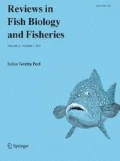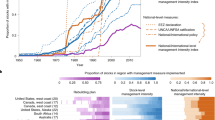Abstract
Global climate change will affect the abundance, distribution, and life history timing of many exploited marine populations, but specific changes are difficult to predict. Management systems in which harvest strategies and tactics are flexible in responding to unpredictable biological changes are more likely to succeed in maintaining productive populations. We explore the adaptability of fisheries management systems in relation to oceanic warming rates by asking how two important management characteristics vary with temperature changes for >500 stocks. (1) Harvest control rules, a framework for altering fishing pressure in response to changes in the abundance of targeted species (primarily due to fishing), may provide the capacity for harvest policies to change in response to climate-driven abundance declines also. (2) Seasonal openings with flexible dates that involve in-season monitoring may allow managers to better respond to possible changes in the timing of life-history periods like spawning to prevent fishing seasons falling out of sync with species’ phenology. Harvest control rules were widely used across industrialized fisheries including in regions that experienced relatively high oceanic warming rates, but after controlling for regional factors we found no association between ocean warming and the use of harvest control rules. Flexible-date seasonal openings were rare compared to fixed-date seasonal openings, but tended to occur in areas with the greatest warming rates while fisheries without seasonal closures tended to occur in areas with the least observed temperature changes. We found no consistent evidence of recent ocean warming effects on the current biomass or exploitation rates relative to management targets of 241 assessed marine populations. Together, these results suggest that the oceanic areas expected to have the greatest climate impacts on populations do at least tend to contain fisheries that demonstrate the potential for adaptability to unpredictable climate impacts.









Similar content being viewed by others
References
Branch TA, Hilborn R (2008) Matching catches to quotas in a multispecies trawl fishery: targeting and avoidance behavior under individual transferable quotas. Can J Fish Aquat Sci 65(7):1435–1446. doi:10.1139/f08-065
Cheung WWL, Lam VWY, Sarmiento JL, Kearney K, Watson R, Zeller D, Pauly D (2010) Large-scale redistribution of maximum fisheries catch potential in the global ocean under climate change. Glob Change Biol 16(1):24–35. doi:10.1111/j.1365-2486.2009.01995.x
Cheung WWL, Pinnegar J, Merino G, Jones MC, Barange M (2012) Review of climate change impacts on marine fisheries in the UK and Ireland. Aquat Conserv Mar Freshw Ecosyst. doi:10.1002/aqc.2248
Christensen RHB (2012) ordinal: regression models for ordinal data. Version 2012.01-19
Crowder LB, Murawski SA (1998) Fisheries bycatch: implications for management. Fisheries 23(6):8–17. doi:10.1577/1548-8446(1998)023<0008:fbifm>2.0.co;2
Drinkwater KF (2005) The response of Atlantic cod (Gadus morhua) to future climate change. ICES J Mar Sci 62(7):1327–1337. doi:10.1016/j.icejms.2005.05.015
Essington TE, Melnychuk MC, Branch TA, Heppell SS, Jensen OP, Link JS, Martell SJD, Parma AM, Pope JG, Smith ADM (2012) Catch shares, fisheries, and ecological stewardship: a comparative analysis of resource responses to a rights-based policy instrument. Conserv Lett 5(3):186–195. doi:10.1111/j.1755-263X.2012.00226.x
Fulton EA (2011) Interesting times: winners, losers, and system shifts under climate change around Australia. ICES J Mar Sci 68(6):1329–1342. doi:10.1093/icesjms/fsr032
Griffith DR (2008) The ecological implications of individual fishing quotas and harvest cooperatives. Front Ecol Environ 6(4):191–198. doi:10.1890/050060
Hilborn R, Walters CJ (1992) Quantitative fisheries stock assessment: choice, dynamics, and uncertainty. Chapman and Hall, New York
Hilborn R, Stewart IJ, Branch TA, Jensen OP (2012) Defining trade-offs among conservation, profitability, and food security in the California current bottom-trawl fishery. Conserv Biol J Soc Conserv Biol 26(2):257–266. doi:10.1111/j.1523-1739.2011.01800.x
Hutchings JA, Myers RA (1994) Timing of cod reproduction: interannual variability and the influence of temperature. Mar Ecol-Prog Ser 108(1–2):21–31. doi:10.3354/meps108021
Jennings S, Brander K (2010) Predicting the effects of climate change on marine communities and the consequences for fisheries. J Mar Syst 79(3–4):418–426. doi:10.1016/j.jmarsys.2008.12.016
Kell LT, Pilling GM, O’Brien CA (2005) Implications of climate change for the management of North Sea cod (Gadus morhua). ICES J Mar Sci 62(7):1483–1491. doi:10.1016/j.icesjms.2005.05.006
Loher T (2011) Analysis of match-mismatch between commercial fishing periods and spawning ecology of Pacific halibut (Hippoglossus stenolepis), based on winter surveys and behavioural data from electronic archival tags. ICES J Mar Sci 68(10):2240–2251. doi:10.1093/icesjms/fsr152
Mace PM (2001) A new role for MSY in single-species and ecosystem approaches to fisheries stock assessment and management. Fish Fish 2(1):2–32. doi:10.1046/j.1467-2979.2001.00033.x
Melnychuk MC, Banobi JA, Hilborn R (2013) Effects of management tactics on meeting conservation objectives for western North American groundfish fisheries. PLoS ONE 8(2):e56684. doi:10.1371/journal.pone.0056684
Melnychuk MC, Essington TE, Branch TA, Heppell SS, Jensen OP, Link JS, Martell SJD, Parma AM, Pope JG, Smith ADM (2012) Can catch share fisheries better track management targets? Fish Fish 13(3):267–290. doi:10.1111/j.1467-2979.2011.00429.x
Murawski SA (2010) Rebuilding depleted fish stocks: the good, the bad, and, mostly, the ugly. ICES J Mar Sci J du Conseil 67(9):1830–1840. doi:10.1093/icesjms/fsq125
Perry AL, Low PJ, Ellis JR, Reynolds JD (2005) Climate change and distribution shifts in marine fishes. Science 308(5730):1912–1915. doi:10.1126/science.1111322
Portner HO, Knust R (2007) Climate change affects marine fishes through the oxygen limitation of thermal tolerance. Science 315(5808):95–97. doi:10.1126/science.1135471
Punt AE (2011) The impact of climate change on the performance of rebuilding strategies for overfished groundfish species of the U.S. west coast. Fish Res 109(2–3):320–329. doi:10.1016/j.fishres.2011.02.019
R Development Core Team (2012) R: a language and environment for statistical computing, 2.14.1 edn. R Foundation for Statistical Computing, Vienna
Restrepo VR, Thompson GG, Mace PM, Gabriel WL, Low LL, MacCall AD, Methot RD, Powers JE, Taylor BL, Wade PR, Witzig JF (1998) Technical guidance on the use of precautionary approaches to implementing National Standard 1 of the Magnuson–Stevens Fishery Conservation and Management Act. National Oceanic and Atmospheric Administration (US) Technical Memorandum NMFS-F/SPO-31
Ricard D, Minto C, Jensen OP, Baum JK (2012) Examining the knowledge base and status of commercially exploited marine species with the RAM legacy stock assessment database. Fish Fish 13(4):380–398. doi:10.1111/j.1467-2979.2011.00435.x
Rosenberg AA, Restrepo VR (1994) Uncertainty and risk evaluation in stock assessment advice for U.S. maine fisheries. Can J Fish Aquat Sci 51:2715–2720
Schaefer MB (1954) Some aspects of the dynamics of populations, important for the management of the commercial fisheries. Bull Inter-Am Trop Tuna Comm 1(2):25–56
Schneider CA, Rasband WS, Eliceiri KW (2012) NIH Image to ImageJ: 25 years of image analysis. Nat Methods 9:671–675
Sims DW, Wearmouth VJ, Genner MJ, Southward AJ, Hawkins SJ (2004) Low-temperature-driven early spawning migration of a temperate marine fish. J Anim Ecol 73(2):333–341. doi:10.1111/j.0021-8790.2004.00810.x
Stock CA, Alexander MA, Bond NA, Brander KM, Cheung WWL, Curchitser EN, Delworth TL, Dunne JP, Griffies SM, Haltuch MA, Hare JA, Hollowed AB, Lehodey P, Levin SA, Link JS, Rose KA, Rykaczewski RR, Sarmiento JL, Stouffer RJ, Schwing FB, Vecchi GA, Werner FE (2011) On the use of IPCC-class models to assess the impact of climate on living marine resources. Prog Oceanogr 88(1–4):1–27. doi:10.1016/j.pocean.2010.09.001
Sumaila UR, Cheung WWL, Lam VWY, Pauly D, Herrick S (2011) Climate change impacts on the biophysics and economics of world fisheries. Nat Clim Chang 1(9):449–456. doi:10.1038/nclimate1301
Turris BR (2000) A comparison of British Columbia’s ITQ fisheries for groundfish trawl and sablefish: similar results from programmes with differing objectives, designs and processes. In: Shotton R (ed) Use of property rights in fisheries management. FAO Fisheries Technical Paper 404/1. FishRights 99 Conference, vol 404/1. FAO, Fremantle, pp 254–261
Walters C (1986) Adaptive management of renewable resources. Macmillan Publishing, New York, NY
Walters CJ (1987) Nonstationarity of production relationships in exploited populations. Can J Fish Aquat Sci 44:156–165
Walters CJ, Martell SJD (2004) Fisheries ecology and management. Princeton University Press, Princeton, NJ
Walters CJ, Hilborn R, Christensen V (2008) Surplus production dynamics in declining and recovering fish populations. Can J Fish Aquat Sci 65(11):2536–2551. doi:10.1139/f08-170
Worm B, Hilborn R, Baum JK, Branch TA, Collie JS, Costello C, Fogarty MJ, Fulton EA, Hutchings JA, Jennings S, Jensen OP, Lotze HK, Mace PM, McClanahan TR, Minto C, Palumbi SR, Parma AM, Ricard D, Rosenberg AA, Watson R, Zeller D (2009) Rebuilding global fisheries. Science 325(5940):578–585. doi:10.1126/science.1173146
Acknowledgments
We thank many fishery scientists and managers for proving information about the use of harvest control rules and seasonal closures through interviews, including: Jane DiCosimo, Diana Stram, Mary Furuness, Edward Poulsen, Scott Kelley, Gretchen Bishop, Dave Harris, Tim Sands, Mark Stichert, Joe Stratman, and Jeff Wadle (US Alaska); John Devore, Kerry Griffin, Kristine Barsky, Kelly Corbett, Scott Groth, Bob Hannah, Peter Kalvass, Heather Reed, Bob Sizemore, Mike Ulrich, and Lorna Wargo (US West Coast); Tom Nies, Andy Applegate, Jason Didden, Toni Kerns, Danielle Chesky, Peter Christopher, Phil Haring, Tom Hoff, José Montañez, and Lori Steele (US East Coast); Tamee Karim, Rob Tadey, Dan Clark, Laurie Convey, Michelle James, Lisa Mijacika, Pauline Ridings, Bryan Rusch, Brenda Spence, and Erin Wylie (Canada West Coast); Analia Giussi, Jorge Hansen, and Marta Renzi (Argentina); Doug Butterworth, Carryn de Moor, Susan Halloway, and Rebecca Rademeyer (South Africa). We thank Alistair Hobday for providing the map shown in Fig. 1. We thank two anonymous reviewers for helpful comments. We thank William Cheung for helpful discussions. We thank the Global Marine Hotspots Network for the invitation to participate in the World Fisheries Congress session and this special issue. Funding for this study was provided by a Comparative Analysis Of Marine Ecosystem Organization (CAMEO) grant through the National Science Foundation and NOAA, by the Walton Family Foundation, and by a Banting Fellowship from the Natural Sciences and Engineering Research Council of Canada.
Author information
Authors and Affiliations
Corresponding author
Electronic supplementary material
Below is the link to the electronic supplementary material.
Rights and permissions
About this article
Cite this article
Melnychuk, M.C., Banobi, J.A. & Hilborn, R. The adaptive capacity of fishery management systems for confronting climate change impacts on marine populations. Rev Fish Biol Fisheries 24, 561–575 (2014). https://doi.org/10.1007/s11160-013-9307-9
Received:
Accepted:
Published:
Issue Date:
DOI: https://doi.org/10.1007/s11160-013-9307-9




